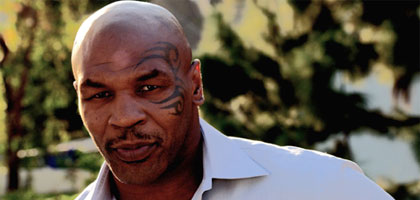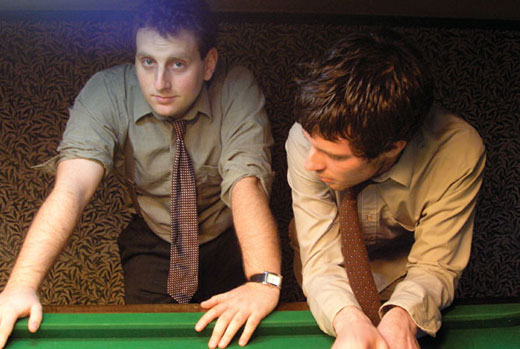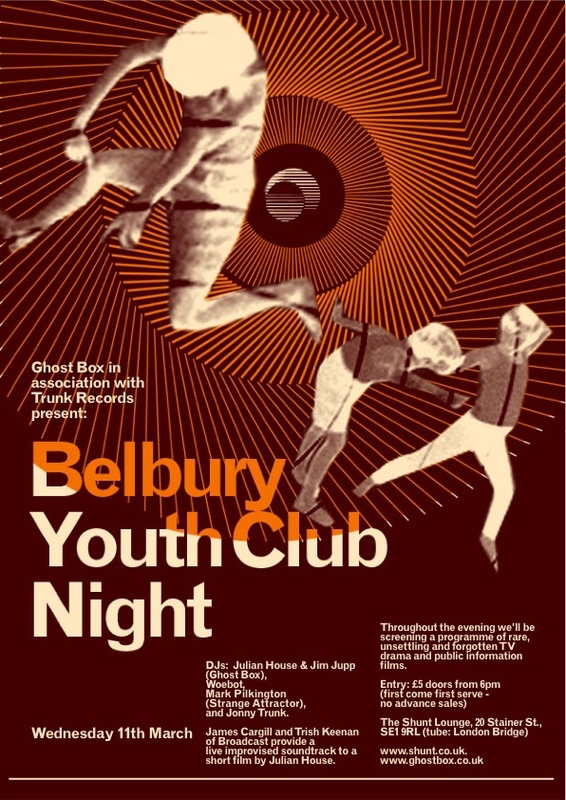March 31, 2009
History always favours the winners
Not unrelated to the last post... James "Caretaker" Kirby has a new blog...
March 30, 2009
David Peace and capitalist realism
The great Padraig Henry. now blogging again at the indispensable Communist Realism (which amongst many other good things is a repository of all of the most interesting responses to the recent Communism conference at Birkbeck) emailed a while back with some observations about Red Riding, which I'm only able to respond to now that I've finally settled in after my latest house move. Padraig:
- I've just watched again the first two episodes (via Channel 4's 'catch up' site, with a screen resolution better than that of my current cable TV provider) of the Red Riding trilogy, and you're absolutely right: I agree that it is one of the best dramas, TV or film, of recent years. It actually combines - or rather scrambles - as its point of departure, two 'genres': the 1970s US conspiracy thriller (particularly - especially - Polansky's Chinatown, with its interrogation of the twin sides of patriarchal capitalism [indeed, one of the albeit few weaknesses of Red Riding is its script, its unsubtle, naive, and desublimated dialogue, unlike Chinatown) and early British 'social realism' (eg Clayton's Room at the Top, etc), but then 'updating' that mix with many of the 'ridiculous sublime' tropes of such as David Lynch (the recurring ominous motifs [eg Dawson's house, fore-shadowing dark confrontation]] and lost-but-prophetic characters [Dawson's disturbed wife], the sublime of [you invoke the Gnostic position] angelic wings amidst and superimposed on appalling destruction: all reminiscent of both Lost Highway and Mulholland Dr.) or Nicolas Roeg [the reporter re-imagining the little girl in red, the occultism, from Don't Look Now], all to achieve, as you stated in your review, an 'expressionist naturalism' that is simultaneously "hypnotic and oneiric" and ostensibly narratively opague.
- I say 'ostensibly' opague because, like Chinatown, although the characters are "caught in a world in which things just don’t add up – they don’t fit together", this is not entirely true of the films themselves. Unlike, for instance, Eyes Wide Shut (or The Shining), in such films as Red Trilogy, Chinatown, Mulholland Dr etc, while they all authentically play with narrative convention (with ellipses, mobius strips, displacement, metaphor) I don't get any real sense that they reject it. Rather, they remain just more sophisticated (and pomo) narrative re-imaginings.
- It would be interesting to analyse, for example, the difference between the reporter's passage a l'act in Red Riding 1974's denouement with, say, Clint Eastwood's at the end of Unforgiven (or even Travis Bickle's in Taxi Driver), among countless others, just as - if I recall correctly - you contrasted the Good of Sethe's killing her child to unplug from a psychotic social system in Beloved with the Evil of a Nazi's wife lethally poisoning her children as martyrs to Aryan dementia in the film, Downfall.
- You state that in "Peace’s world, there is no sense of acceptance: his novels read like howls of agony and calls for retribution – divine or otherwise." Certainly, but doesn't their own fatalism ultimately defeat what they were - presumably - setting out to achieve? [Alternatively, while the films are a vast improvement on the patronizing, plodding and ultimately conformist 'social realism' of left humanists like Ken Loach or Mike Leigh, and that this 'pulp modernist' approach is to be everywhere defended and lauded ... it still doesn't get us anywhere .... (I'm reminded of your criticisms of Frank Miller et al in your review of Batman Begins a few years ago. Capitalist Realism anyone?].
Padraig then went on to nuance his response after seeing 1983:
- Just a note to revise what I said earlier (below) about capitalist realism re Red Riding. I've since seen the third and final episode of the trilogy, with its redemptive denouement, so no, obv not cap realism. I was judging solely on the basis of the first two episodes (and just the films, not Peace's novels, which I hadn't read). It's a denouement, though, that stretches all narrative credibility: three characters - one corrupt (the cop), one washed up (the solicitor), one traumatically victimized (BJ) - all simultaneously - after so many years of subject-less inaction - suddenly setting out to confront Peter Mullen's sociopath/pedo priest. The third episode is all a bit too neat, really, too eager to tie up all the loose ends and ellipses (that whole first wedding sequence, while beguilingly nostalgic drama, was narratively redundant: we can infer from the first two episodes who all or most of the cop-conspirators are, and what the business deal with Dawson entailed). Nevertheless, it's still great TV drama in an otherwise undead TV landscape.
The plot was never one of the strengths of the novels in any case. In fact, one of the strange things about Peace's novels is the way that they are extraordinarily compulsive, yet not driven by plot; or rather the plot-drive is subordinated to a death drive, which, rather than reaching any sort of resolution, endlessly circulates around a number of lost objects (the Ripper's victims in 1977 and 1980; the dead girls in 1974 and 1983, the brutally lyrical litany of their names: Susan Ridyard, Clare Kemplay, Jeanette Garland, Hazel Atkins - Miss the Girl). The lack of any ultimate answers is part of what gives the RR novels and films a special poignancy in this, the decade of Madeleine McCann, a missing girl saturated with cinematic associations (Don't Look Now again, but also Vertigo and Chris Marker's conjuction of Hitchcock and Proust), and the absence at the heart of an unresolved media-hyperreal hyperfiction I tried to analyse at the end of this.
One exasperated message board contributor recently wrote of the Red Riding novels that "they're too good as detective stories to not get drawn into reading them as if all the loose ends could be drawn together." Yet what makes the novels fascinating is precisely the way they deconstruct the form of the Crime novel, continually frustrating expectations without ever dismissing them. In place of answers, unintelligible signs (as one contributor to the same message board put it: "Most crime writers give you revelations in the last few pages, Peace gives you Revelations"); in place of closure, a fissured fatality, an Underground Kingdom made of (plot) holes.
The 1983 film in particular might have appeared to lose faith with this aspect of Peace's fiction. In his interview with Sight & Sound, the screenwriter Tony Grisoni justified his changing of 1983's ending (from black holes of self-abolition and revenge-homicide in the novel into something redemptive in the film) because of the Natasha Kampusch case: Kampusch emerged from her captor's Underground Kingdom whilst Grisoni was working on the script and he wanted to "save one of the girls". (The Kampusch and the Josef Fritzl cases are more reasons that the Red Riding novels have an uncanny poignancy this decade; and they also show that which the ridiculous-sublime cannot be straightforwardly opposed to the plausible; the ridiculous-sublime is what is in excess of consensual reality, not necessarily what is empirically impossible but what is unthinkable). Yet I think that the film's oneiric qualities give it a perhaps unintended epistemological slipperiness - Piggot and Jobson's unlikely divine light-haloed rescue of the girl reminded me of the very end of Taxi Driver, which I can never decide whether to treat as belonging to the film's reality or a redemptive fantasy conjured by Travis's dying mind.
To turn now to the important question of Peace's relationship to capitalist realism. Padraig raises a number of issues that did cross my mind as I was writing the piece on the Red Riding films for frieze.com: namely, what differentiates Peace from something like Frank Miller's world without Good? And does a represented redemption stop a fiction from being capitalist realism? And, conversely, does the absence of redemption entail at least an affinity with capitalist realism's brute pragmatism? Initially, I'd answer this by expanding the comparison between Peace and Ellroy that I sketched in the Red Riding piece. Mike Davis's observations on Ellroy's LA Quartet perfectly capture the way in which Ellroy exemplified capitalist realism:
- At times an almost unendurable wordstorm of perversity and gore, Quartet attempts to map the history of modern Los Angeles as a secret continuum of sex crimes, satanic conspiracies, and political scandals. For Ellroy ... the unsolved 'Black Dahlia' case of 1946 is the crucial symbolic commencement of the postwar era - a local 'name of the rose' concealing a larger, metaphysical mystery. Yet in building such an all-encompassing noir mythology (including Stephen King-like descents into the occult), Ellroy risks extinguishing the genre's tensions, and, inevitably, its power. In his pitch blackness there is no light left to cast shadows and evil becomes a forensic banality. The result feels very much like the actual moral texture of the Reagan-Bush era: a supersaturation of corruption that fails any longer to outrage or even interest.
- Indeed the postmodern role of L.A. noir may be precisely to endorse the emergence of homo reaganus.
Of course, this becomes even more explicit (one might say heavy handed) with American Tabloid and The Cold Six Thousand, which appear to be written to illustrate the thesis Ellroy outlines in the preface to American Tabloid: there never was any Good, corruption is originary. But, even though Peace's Yorkshire is scarcely any less "supersaturated with corruption" than Ellroy's LA, I think that it's practically impossible for any reader to think of Peace as (retrospectively) "endorsing the emergence of homo thatcherus". Quite to the contrary. Owen thinks that the Red Riding novels need GB84 for their (political) message to fully come out, and I would certainly agree that, by this point, it is no longer even remotely possible to read Peace as justifying, normalising or in any way desensitizing the 'harsh realities' of neoliberalism. One of the differences between the Red Riding novels and GB84 is a switch from religion and theodicy (there must be a God to make good all that suffering, all those atrocities) to politics (there must be a better way to live than this). (As it happens, though, I think that Peace's tendency at that time to "add a layer of diabolical evil on top of the historical evils [he] fictionalise[s]" is a mistake, part of the [bad] lurid legacy from Ellroy. Judging from this interview in Socialist Worker, Peace agrees, saying that he "slightly regrets" some of the Crime elements in GB84. He also explains there why he didn't "tack" GB84 onto the end of the Red Riding Quartet. With The Damned Utd, Peace demonstated that he could work his sorcery by only minimally augmenting the facts.)
If there is no redemption in GB84, it is because history had none to offer; yet GB84 is clearly not a work of capitalist realism - rather, it is about the process of engendering capitalist realism here, the brutal battle for the hearts and minds that prepared the way for the establishment of neoliberalism in Britain. It isn't a redemption within the fiction's represented world that prevents a work from being capitalist realist; rather, it is the attitude that the book expresses and provokes towards the world it discloses that is decisive. To use Joyce's classic distinction between kinetic and static art, both Peace and Ellroy are "kinetic" writers; what differentiates them is the way that the "loathing" they excite effects the reader. (Stephen Dedalus's (modernist-aestheticist) claim, remember, was that "the feelings excited by improper art are kinetic, desire or loathing. Desire urges us to possess, to go to something; loathing urges us to abandon, to go from something. These are kinetic emotions. The arts which excite them, pornographical or didactic, are therefore improper arts.") Ellroy's message: this is the world, live with it, adjust your expectations to fit it, accept your corrupt protectors, mythologise them, because they are all that separates you from something even worse. Peace's message: if this is the world, then it must be rejected, abominated, destroyed, even if it is the best world we can realistically expect.
March 26, 2009
Upcoming on zer0

Cold World
Dominic Fox
978-1-84694-217-4
Price: $14.95 / £7.99
Date of publication: 25 September 2009
To live well in the world one must be able to enjoy it: to love, Freud says, and work. Dejection is the state of being in which such enjoyment is no longer possible. There is an aesthetic dimension to dejection, in which the world appears in a new light. In this book, the dark serenity of dejection is examined through a study of the poetry of Hopkins and Coleridge, and the music of "depressive" black metal artists such as Burzum and Xasthur.
The author then develops a theory of "militant dysphoria" via an analysis of the writings of the Red Army Fraction's activist-theoretician, Ulrike Meinhof. The book argues that the "cold world" of dejection is one in which new creative and political possibilities, as well as dangers, can arise. It is not enough to live well in the world: one must also be able to affirm that another world is possible.
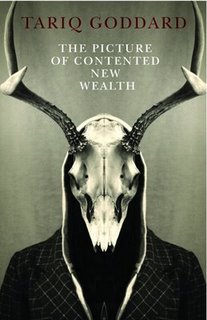
The Picture of Contented New Wealth
Tariq Goddard
978-1-84694-270-9
Price: $19.95 / £9.99
Date of publication: 24 September 2009
In the brilliant red doom of a Hampshire Sunset Brigit Conti can hear a voice behind her ears that is not her own. Bed-bound, and complaining of a rare bone disease that no Doctor can diagnose, her husband fears that the house they have purchased is a portal through which an older, more malign energy has passed, possessing his wife and son. Through their successive deterioration his secular and agnostic world-view undergoes a metamorphosis, drawing him to a strange man from the hills: the Rector, their unlikely saviour.
Or are he and his family merely victims of their own self-serving yuppie way of life?
'You were the picture of contented new wealth' is a gothic tragedy set in the nineteen eighties, bringing proper characterisation and a literary sensibility to the traditional horror story. It's mix of generic elements and mystical realism deal with the irreducibility of evil and its successful normalisation in to our daily and dominant reality.
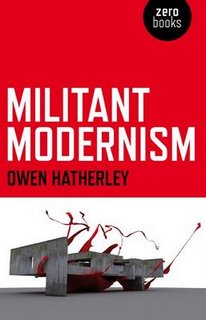
Militant Modernism
Owen Hatherley
978-1-84694-176-4
Price: $19.95 / £9.99
Date of publication: 24 April 2009
This book is a defence of Modernism against its defenders. In readings of modern design, film, pop and especially architecture, it attempts to reclaim a revolutionary modernism against its absorption into the heritage industry and the aesthetics of the luxury flat.
Militant Modernism argues for a Modernism of everyday life, immersed in questions of socialism, sexual politics and technology. It features new readings of some familiar names - Bertolt Brecht, Le Corbusier, Vladimir Mayakovsky - and much more on the lesser known, quotidian modernists of the 20th century. The chapters range from a study of industrial and brutalist aesthetics in Britain, Russian Constructivism in architecture, the Sexpol of Wilhelm Reich in film and design, and the alienation effects of Brecht and Hanns Eisler on record and on screen.
Against the world of 'there is no alternative', this book talks about things we haven't done yet, in the past tense.
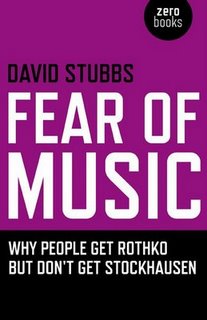
Fear of Music
David Stubbs
978-1-84694-179-5
Price: $19.99 / £9.99
Date of publication: 24 April 2009
Modern art is a mass phenomenon. Conceptual artists like Damien Hirst enjoy celebrity status. Works by 20th century abstract artists like Mark Rothko are selling for record breaking sums, while the millions commanded by works by Andy Warhol and Francis Bacon make headline news.
However, while the general public has no trouble embracing avant garde and experimental art, there is, by contrast, mass resistance to avant garde and experimental music, although both were born at the same time under similar circumstances - and despite the fact that from Schoenberg and Kandinsky onwards, musicians and artists have made repeated efforts to establish a "synaesthesia" between their two media.
This book examines the parallel histories of modern art and modern music and examines why one is embraced and understood and the other ignored, derided or regarded with bewilderment, as noisy, random nonsense perpetrated by, and listened to by the inexplicably crazed. It draws on interviews and often highly amusing anecdotal evidence in order to find answers to the question: Why do people get Rothko and not Stockhausen?
March 18, 2009
If I was a communist...
My report on the Idea Of Communism conference is now up at frieze.com. Further reflections to follow here under the title 'Eliminativists Like Us'....
March 14, 2009
Red Riding footnote
Anyone who watched 1980 after reading my piece on Frieze.com might have been confused by my reference to its "postpunk-like" soundtrack. Sadly, it appears that the soundtrack was changed between the preview disc I had and the broadcast version, all for the worse: on the preview disc, it was all electronics and dissonant, expressionist guitar, on the broadcast version gloopy rentastrings. Shame...
Tell me about it
Christian Marazzi reads my fortune....
- Try to be freelance and you'll spend 50% of your time just looking around, the working day expands, but you are paid only for what you have done.
March 11, 2009
Public intimacy and radiophonic collectivity
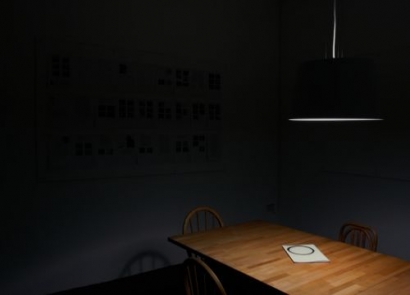
A belated thanks to everyone who came to the londonunderlondon event two weeks ago at Gasworks, and of course thanks to Kodwo and the Otolith group for organising it, and to Sukhdev for appearing on the panel. It was great to hear the piece repotentiated so long after it was produced. Partly what is inspiring to me about listening to it again is that the form - Kodwo called it an 'audio essay' and a 'sonic fiction' but neither description seem quite right - is crying out for further exploration and extrapolation. If music gives every impression of being exhausted, then the possibilities for combining sound and voice hardly seem have to begun to be investigaged.
I've always thought that he piece functions well as an Ambient, something whose drifts listeners can themselves drift in and out of. Yet playing it to a group in near darkness revealed that it functions most intensely when subjected to collective deep listening. This kind of deep listening is rare for any kind of sound piece now, what with network pressure and mouse twitch inducing a constant migration of attention across the digital matrix. It could even be said that the piece was transformed by such an act of collective listening. Here we could perhaps extend Jonathan Beller's arguments in The Cinematic Mode Of Production about how looking adds value. Beller mordantly observes that economic value is created now not primarily by a worker acting on raw materials but by people consuming images - "to look is to labour", in his infamous phrase. If an image is made and no-one consumes it, it has no economic value - the attention economy's solution to the old idealist problem of 'if a tree falls in a forest and no-one hears it, does it make a sound?' Yet what about other types of value beyond the narrowly economic? And how might listening function differently to looking?
One often dreams, or rather fantasises, about sharing with others a particularly intimate experience of music but the experience of playing music either to a little other or to a bigger other (a crowd) rarely matches up to the fantasy. In the first example, because the music cuts through conviviality too much: it is as likely to produce embarrassment as a shared enjoyment (or enjoyment of the other's enjoyment). The intimacy of music produces an ontological rupture, a disruption of the face to face, something captured in those uneasy and uncomfortable moments in musicals when someone first begins to sing. The lesson of musicals is that the Song can never be smoothly sutured back into the social (and it was of course Dennis Potter who did most to examine the difference between the social-as-symbolic order and the Real of the songs). In the second example, the case of playing intimate music to a crowd, the intimacy is usually lost in hubbub of sociality. What was interesting about deep listening at Gasworks was that the social was suspended in order to produce what Kodwo called a 'collective intimacy'. This was a different mode of collective experience both to the radiophonic collectivity of the original broadcast (people in different locations listening to the same thing) or to the still-standard images of collectivity as the clamour and rabble of a street crowd.
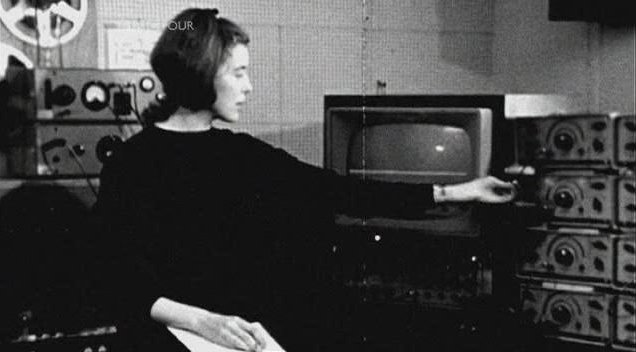
Another thing that occured to me after Gasworks is just how mutable londonunderlondon is, how much the way it sounds depends upon the system it is played on oand the space that is played in. Partly this is a consequence of 'bad' mixing, a reflection of my incompetence but also the limitations of the technical set-up we were using. But I love the fact that the piece was done with a Jurassic PC, a cheap mic and a minidisc recorder and mixed using tiny computer speakers: that's k(yber)-punk. The sound is in no sense normalised; on the contrary, it is volatile and eratic; voices which can be discerned on some systems and with some EQ set-ups are obliterated on other systems and in other spaces. I'd never heard before londonunderlondon played as loud as it was before Gasworks, and at times like a Noise piece, or rather, at points it was as if the electronic Noise was eating the voices.
*************************************************************
Some interesting responses to the event at Mountain *7 . I plead guilty to being 'too well-read', but I will leave it to others to decide if that impedes the enjoyment of londonunderlondon. I guess part of what interested me about londonunderlondon was that the literate and the literary need not be opposed to the sonic. As I say, it is not music, even though it hijacks certain sonic intensities from music. It could equally well be seen as a literary exercise with sound as a musical piece. One thing that I can categorically say, though, is that, if Derrida and hauntology played any part in the discussions leading up to londonunderlondon it was a very minor one. As far as I can tell, my first discussion of hauntology (the word) was in this post, from 2006, after londonunderlondon had been broadcast; that post is a kind of Overlook hotel which leads back into the past via hyperlinks, and there's no doubt that spectrality has haunted this site since its inception, but my interest in the Derridean take on all that certainly came post-londonunderlondon. The fact that londonunderlondon now sounds like a demonstration of theses about hauntology is down to the uncanny temporality of hauntology itself.... lol....
One other factual quibble with Mountain*7. I know that londonunderlondon was billed as 'my' audio-essay; but, as the event made clear, Justin Barton was at least my equal partner in conceptualising it and producing it, so I hope that it will be attributed to both Justin and myself from now on.
btw, should anyone be interested in the the text I wrote for lul, it's here.
March 04, 2009
"Were the police really this corrupt?"
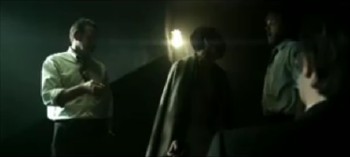
Me on the Birtish* TV event of the decade, C4's outstanding Red Riding trilogy... UK readers, make sure you tune into this tomorrow night... and keep faith with it if you have doubts about 1974 ... the three films together are greater than the sum of the parts, and 1974 is the weakest film, just as it is the weakest of the novels... I love the fact that it has already produced a few tiny cracks in capitalist realist good sense, prompting the Radio Times (see below) to ask, "were the police really this corrupt"? Even this question, even the raising of the possibility that there might be a brutal Real beyond the PR-slick Dixon Of Dock Green cops on Crimewatch, shows how the media can still be a contested zone. Astonishingly, it seems that - even at this late stage, after all C4's betrayals and compromises, after the BBC's capitulations and evasion - it is still possible for British television to do more than circulate images of/ for the dominant ideology.
There's more material for a discussion of the differences between the state and the public here. The Red Riding films have been produced as part of C4's public service remit, indeed they might be a belated attempt to fulfill it - as Nick James notes in his editorial in the March issue of Sight & Sound, the fact that C4 will soon be called upon to justify its funding was no doubt part of the motivation for its making such a challenging sequence of dramas at this time. Nevertheless, here is a situation in which the public sphere and the machinery of the state, far from being the same thing, are in a relationship of antagonism. Under capitalist realism, it's routine for public service to be equated with support of consensual reality and its protectors. Yet with Red Riding, it's as if C4 are doing the equivalent with TV drama of what Dominic Fox (semi)jokingly asked for when he suggested that the BBC should "expand the remit of Crimewatch to include police corruption and brutality". It is precisely the exorbitance of Peace's vision of corruption, its complete lack of even-handedness, its inversion of the bad apple model (it is the good coppers who are the exception in Peace's world, and even they are tainted), that is so valuable now in this time of massive reaction and restoration.
*Bat draws my attention to this Freudian slip of a typo
March 02, 2009
Seconds out...
The Hardcore Continuum? A discussion
Presented by the Centre for Cultural Studies Research, University of East London
In association with The Wire (www.thewire.co.uk)
UEL Docklands Campus (Cyprus DLR)
April 29th 2009 2:00pm-6:00pm
Simon Reynolds' commentary on the ‘'hardcore continuum'’ - the mutating sequence of dancefloor music to have emerged from the breakbeat hardcore matrix of the early 1990s - has recently generated intense debate in the musical blogosphere.
What is the value of this concept? Does it still usefully describe the context from which dynamic new beat musics emerge? Can the conditions of creativity in the 1990s be replicated in the era of web 2.0? Should we even want them to be?
Speakers: Mark Fisher (K-Punk), Alex Williams (Splintering Bone Ashes), Steve Goodman (Kode 9), Lisa Blanning (The Wire), Dan Hancox (Guardian, New Statesman), Kodwo Eshun (Author of More Brilliant than the Sun), Joe Muggs (Mixmag, The Wire), Jeremy Gilbert (Co-author of Discographies)
Attendance is free but pre-registration is recommended. For info or to register contact J.Gilbert@uel.ac.uk
